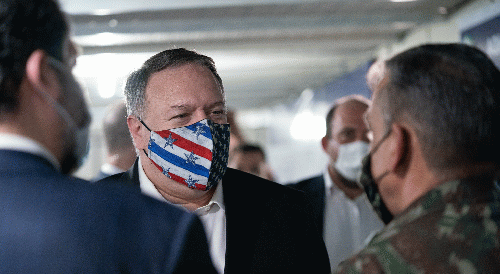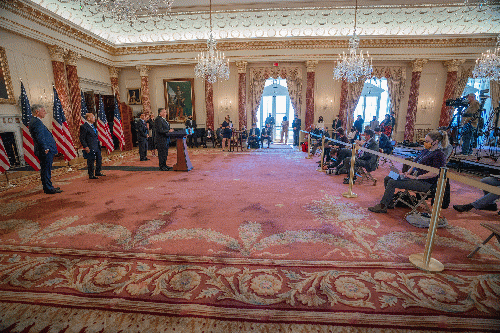From Consortium News

Secretary of State Michael Pompeo during a visit to a Venezuelan migrant and refugee reception center in Boa Vista, Brazil, Sept. 18, 2020.
(Image by (State Department, Ron Przysucha)) Details DMCA
Will we start a war with Iran? Will we invade Venezuela? Will we push the Russian Federation a step too far into a desperate corner? Will we confront Russian troops in Syria? Will we provoke China into a strike across the Taiwan Strait? It is bitter, for American citizens, that these questions now press upon us. Two months before our presidential election, the world according to Mike Pompeo all at once assumes a frightening clarity.
Pompeo is the most dangerously deluded secretary of state since John Foster Dulles, whose paranoiac lawlessness held the world in some proximity to chaos until illness, which can sometimes prove a mercy for the rest of us, forced him to resign late in President Dwight D. Eisenhower's second term.
Our rotund top diplomat is forever advising us that "the word will be safer" in consequence of the many aggressions he directs. Dulles used to say the same back in the 1950s. Now as then, can any thought be emptier in the face of the perils perfectly evident out our windows?
As this dreadful year draws near its close, we are at far more risk of war than we were at its start. Your columnist wondered in this space as the Covid-19 pandemic exploded upon us whether the U.S. would set aside its too-numerous animosities and ideological obsessions in the name of common humanity. Not a chance. Pompeo the poseur Christian was never going to prove capable of any such thing.
UN Sanctions

Secretary of State Michael Pompeo delivers remarks on Iran Snapback Sanctions, Washington, D.C., Sept. 21, 2020.
(Image by (State Department, Ron Przysucha)) Details DMCA
On Saturday evening, midnight GMT, Pompeo declared in Washington that "virtually all previously terminated UN sanctions" against Iran are reimposed -- an invocation of the "snapback" provision written into the 2015 accord governing the Islamic Republic's nuclear programs.
This is farce, of course. The U.S. is no longer party to the nuclear pact and has no legal standing to announce that the UN is doing anything related to it. The entire Security Council, other than the admittedly powerful Dominican Republic, dismisses Pompeo's position and has no intention of abiding by it.
It is an excellent thing that the U.S. has isolated itself on the Iran question, and excellent again that Pompeo's astonishing overestimation of American power is on such clear and full display. But there is more to this story.
Strike Group in Strait of Hormuz
Last Friday, a day before Pompeo's sanctions announcement, the Pentagon disclosed that a carrier strike group and two missile-carrying cruisers had just passed through the Strait of Hormuz the first such deployment in the Persian Gulf since John Bolton, then Trump's national security adviser, ordered a similar force into the region more than a year ago.
With this, Pompeo's choreography is evident. Given his imminent failure at the UN, sending the Nimitz and its attendant group into the Gulf now appears to be preparation for the U.S. to enforce unilaterally the sanctions nobody else takes seriously. These are likely to apply to foreign-flag vessels as well as Iranian ships.
We're looking at what, if the U.S. goes through with this, will amount to a blockade of the Islamic Republic. Any Iranian response will then be cast as aggression, and Pompeo will get his longed-for war.
Trita Parsi, co-founder and executive veep at the Quincy Institute, writes that he may be looking for "an October Surprise; a confrontation with Iran that will be cast as both defensive and lawful." Parsi predicts that hostilities could begin as early as this week.
(Note: You can view every article as one long page if you sign up as an Advocate Member, or higher).





